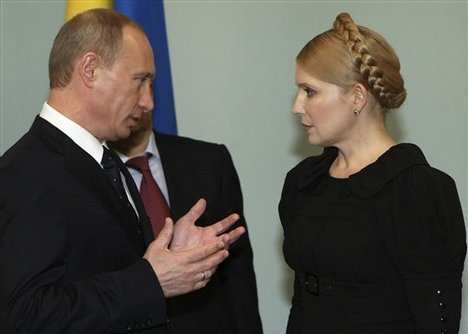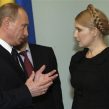
Yanukovych, Tymoshenko Hold Opposite Views on Russian Gas
Publication: Eurasia Daily Monitor Volume: 7 Issue: 18
By:

Both Prime Minister Yulia Tymoshenko and her opponent in the February 7 presidential election runoff, the former Prime Minister Viktor Yanukovych, have sought Moscow’s support for their campaigns. Both are expected to be rather pro-Russian compared to the outgoing pro-Western President Viktor Yushchenko, who is perceived in Moscow as a Russophobe. However, Tymoshenko and Yanukovych hold opposite views on the gas trade with Russia. Yanukovych wants to revise the January 2009 gas contracts with Russia and to set up an international consortium to manage Ukraine’s pipelines. Tymoshenko defends the contracts and rejects the consortium.
Yanukovych who, as opinion polls predict, is more likely to be elected as the next president than Tymoshenko, called the gas contracts “enslaving,” addressing his potential voters in Dnipropetrovsk which is part of Ukraine’s industrial heartland. He said the price for Ukraine should be “just” (Ukrainska Pravda, January 12). Speaking in western Chernivtsi, Yanukovych said he would be ready to negotiate a revision of the contracts with Moscow immediately after his election as president (Interfax-Ukraine, January 19). Kommersant-Ukraine daily reported on January 13 that Gazprom took Yanukovych’s threat seriously, so it was preparing to go to court to defend the contracts.
Parts of southeastern Europe were left to freeze in early January 2009 because of the gas price dispute between Ukraine and Russia. There were fears of a repetition of this, as the debt-ridden Naftohaz Ukrainy, the state-owned oil and gas behemoth, has no cash to pay Gazprom. However, Ukraine’s central bank came to the rescue, lending to Naftohaz from its reserves. Fears about Naftohaz’s ability to pay for gas will only grow as its financial condition is unlikely to improve anytime soon. Meanwhile, the Russian gas price for Ukraine will increase by the end of 2010. The average annual price for Ukraine is expected to grow to $280 per 1,000 cubic meters in 2010 from $228 per 1,000 last year.
The metal and chemical industries in Yanukovych’s strongholds of east and south Ukraine will suffer most from the price increase, hence Yanukovych’s determination to revise the contracts. Tymoshenko’s electorate in the predominantly rural central and western Ukraine is less dependent on Russian gas. Similarly, Tymoshenko does not want to spoil her good relations with Russian Prime Minister Vladimir Putin, so she defends the contracts according to which Ukraine pays a higher price for gas than most of its neighbors. However, while the contracts brokered by Tymoshenko and Putin were based on market principles, Yanukovych essentially suggests returning to the era of former President Leonid Kuchma (1994-2004), when Russia sold cheap gas to Ukraine in exchange for political and other concessions.
One concession Yanukovych is ready to make is establishing a consortium with Russia to run Ukraine’s gas transit network. Yanukovych announced that if he won the election he would initiate setting up an international consortium to manage Ukraine’s gas pipelines. He said this should help increase their throughput capacity. In exchange for the consortium, Ukraine should receive a “just” price for its gas from Russia, Yanukovych said. Gazprom reportedly hailed Yanukovych’s initiative, saying that the “Belarusian option” may be applied to Ukraine. Belarus sold 50 percent of its gas transit network to Gazprom in 2006 in exchange for cheap gas. However, discounts for Belarus are only temporary (Kommersant-Ukraine, January 22).
Tymoshenko lambasted Yanukovych for his statements on the consortium. Addressing local officials in Kyiv Region, which is her stronghold, she said that the consortium creation would be tantamount to “stealing the gas pipeline from Ukraine and full liquidation of the transit network.” Tymoshenko said that she would not allow such a consortium, adding that the gas transit network would remain state-owned. She estimated the value of the network at “hundreds of billions of dollars,” which was probably an exaggeration. Tymoshenko said that when she replaced Yanukovych as prime minister in 2007, she thwarted his plans to lease Ukraine’s gas transit network to Russia (UNIAN, January 23).
Yanukovych also suggested that Ukraine should participate in the Russian Nord Stream and South Stream gas pipeline projects, which are aimed at decreasing Russia’s dependence on the Ukrainian transit route. Yanukovych suggested this could compensate Ukraine for losses from a decrease in gas transit due to the imminent launch of the two pipelines (Ukrainski Novyny, January 20). In this case, Yanukovych apparently lobbies for the interests of his crony, the steel tycoon Rinat Akhmetov whose Khartsyzk Pipe Plant could supply large-diameter pipes for the Russian projects.
It is interesting that the former central bank governor, Serhy Tyhypko, to whom Tymoshenko promised the post of prime minister if she were elected president, is on Yanukovych’s side as far as the gas trade is concerned. Tyhypko, like Yanukovych, believes that the gas contracts should be revised and that Russia should obtain a share in Ukraine’s gas pipelines (Ukraina TV, January 13). Speaking after the first round of the presidential election in which he came third with 13 percent after Yanukovych and Tymoshenko, Tyhypko suggested that 25 percent of the shares in a consortium to manage the pipelines should belong to Gazprom, 25 percent to investors from the European Union, and the rest to Ukraine (1+1 TV, January 17).




